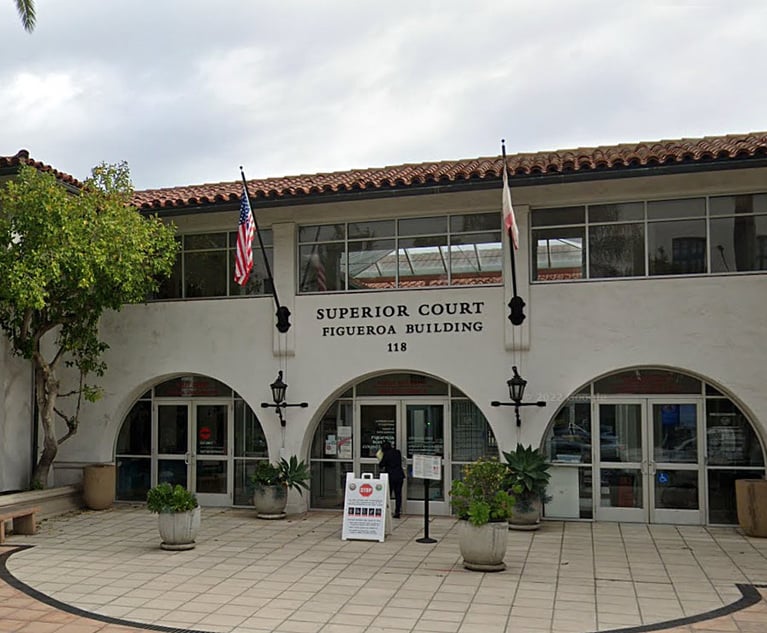 Judge Kimberly Mueller, U.S. District Court for the Eastern District of California
Judge Kimberly Mueller, U.S. District Court for the Eastern District of CaliforniaJudge Re-Ups Decision Blocking California's Mandatory Employee Arbitration Ban
U.S. District Judge Kimberly Mueller of the Eastern District of California, who previously granted a temporary restraining order barring the enforcement of Assembly Bill 51, on Friday granted a preliminary injunction blocking the law that she found preempted by the Federal Arbitration Act.
January 31, 2020 at 03:23 PM
3 minute read
A federal judge in Sacramento has once again called a stop to enforcement of a California law that would outlaw mandatory arbitration agreements in employment contracts in the state.
U.S. District Judge Kimberly Mueller of the Eastern District of California, who late last year granted a temporary restraining order barring the enforcement of Assembly Bill 51, on Friday granted a preliminary injunction "in full" blocking the state from enforcing the law that she has found preempted by the Federal Arbitration Act. Mueller issued the injunction in a minute order but said that she would lay out her reasoning in a forthcoming written order "in the coming days."
In issuing a temporary restraining order in the case last month, Mueller wrote that if the law were allowed to go in place it could disrupt the creation of employment contracts, especially given that a violation of the AB 51 would be considered a misdemeanor.
Business groups including the U.S. Chamber of Commerce, the National Retail Federation and the California Retailers Association sued to block the law claiming it was preempted by the Federal Arbitration Act. Mayer Brown's Donald Falk and Archis Parasharami and Bruce Sarchet of Littler Mendelson represented the plaintiffs at a Jan. 10 hearing on the preliminary injunction motion. Falk said in an email Friday that he and his clients were "gratified by the court's order and look forward to her full written decision and the further proceedings in this case."
Allan Zaremberg, president and CEO of the California Chamber of Commerce, another of the plaintiffs, said the group was "pleased the court recognized the fact that placing businesses at risk for criminal penalties for a practice that has long been supported both by California and federal law was excessive."
Chad Stegeman of the California Department of Justice represented the state. A press representative of the department that the office was reviewing the decision.
Jacqueline Serna, deputy legislative director at Consumer Attorneys of California, which backed the bill, said that the decision will mean worker grievances "will for now continue to be forced into private and secret arbitrations rather than have a shot at justice in the fairer forum of a court of law."
"Our hope is that, ultimately, in the courts or in Congress, fairness will prevail and this era of forced arbitration can be put behind us," she said.
This content has been archived. It is available through our partners, LexisNexis® and Bloomberg Law.
To view this content, please continue to their sites.
Not a Lexis Subscriber?
Subscribe Now
Not a Bloomberg Law Subscriber?
Subscribe Now
NOT FOR REPRINT
© 2024 ALM Global, LLC, All Rights Reserved. Request academic re-use from www.copyright.com. All other uses, submit a request to [email protected]. For more information visit Asset & Logo Licensing.
You Might Like
View All


Santa Barbara Judge Accused of Moonlighting as Attorney for Secretary/Girlfriend
4 minute readLaw Firms Mentioned
Trending Stories
- 1Decision of the Day: Judge Reduces $287M Jury Verdict Against Harley-Davidson in Wrongful Death Suit
- 2Kirkland to Covington: 2024's International Chart Toppers and Award Winners
- 3Decision of the Day: Judge Denies Summary Judgment Motions in Suit by Runner Injured in Brooklyn Bridge Park
- 4KISS, Profit Motive and Foreign Currency Contracts
- 512 Days of … Web Analytics
Who Got The Work
Michael G. Bongiorno, Andrew Scott Dulberg and Elizabeth E. Driscoll from Wilmer Cutler Pickering Hale and Dorr have stepped in to represent Symbotic Inc., an A.I.-enabled technology platform that focuses on increasing supply chain efficiency, and other defendants in a pending shareholder derivative lawsuit. The case, filed Oct. 2 in Massachusetts District Court by the Brown Law Firm on behalf of Stephen Austen, accuses certain officers and directors of misleading investors in regard to Symbotic's potential for margin growth by failing to disclose that the company was not equipped to timely deploy its systems or manage expenses through project delays. The case, assigned to U.S. District Judge Nathaniel M. Gorton, is 1:24-cv-12522, Austen v. Cohen et al.
Who Got The Work
Edmund Polubinski and Marie Killmond of Davis Polk & Wardwell have entered appearances for data platform software development company MongoDB and other defendants in a pending shareholder derivative lawsuit. The action, filed Oct. 7 in New York Southern District Court by the Brown Law Firm, accuses the company's directors and/or officers of falsely expressing confidence in the company’s restructuring of its sales incentive plan and downplaying the severity of decreases in its upfront commitments. The case is 1:24-cv-07594, Roy v. Ittycheria et al.
Who Got The Work
Amy O. Bruchs and Kurt F. Ellison of Michael Best & Friedrich have entered appearances for Epic Systems Corp. in a pending employment discrimination lawsuit. The suit was filed Sept. 7 in Wisconsin Western District Court by Levine Eisberner LLC and Siri & Glimstad on behalf of a project manager who claims that he was wrongfully terminated after applying for a religious exemption to the defendant's COVID-19 vaccine mandate. The case, assigned to U.S. Magistrate Judge Anita Marie Boor, is 3:24-cv-00630, Secker, Nathan v. Epic Systems Corporation.
Who Got The Work
David X. Sullivan, Thomas J. Finn and Gregory A. Hall from McCarter & English have entered appearances for Sunrun Installation Services in a pending civil rights lawsuit. The complaint was filed Sept. 4 in Connecticut District Court by attorney Robert M. Berke on behalf of former employee George Edward Steins, who was arrested and charged with employing an unregistered home improvement salesperson. The complaint alleges that had Sunrun informed the Connecticut Department of Consumer Protection that the plaintiff's employment had ended in 2017 and that he no longer held Sunrun's home improvement contractor license, he would not have been hit with charges, which were dismissed in May 2024. The case, assigned to U.S. District Judge Jeffrey A. Meyer, is 3:24-cv-01423, Steins v. Sunrun, Inc. et al.
Who Got The Work
Greenberg Traurig shareholder Joshua L. Raskin has entered an appearance for boohoo.com UK Ltd. in a pending patent infringement lawsuit. The suit, filed Sept. 3 in Texas Eastern District Court by Rozier Hardt McDonough on behalf of Alto Dynamics, asserts five patents related to an online shopping platform. The case, assigned to U.S. District Judge Rodney Gilstrap, is 2:24-cv-00719, Alto Dynamics, LLC v. boohoo.com UK Limited.
Featured Firms
Law Offices of Gary Martin Hays & Associates, P.C.
(470) 294-1674
Law Offices of Mark E. Salomone
(857) 444-6468
Smith & Hassler
(713) 739-1250







